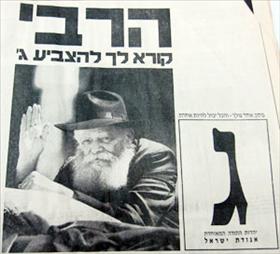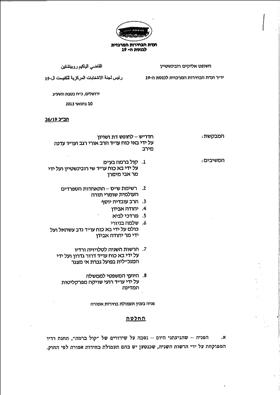Hiddush turns to Justice Joubran: Stand against religious bribery!
Ultra-Orthodox parties' history of voters' faith manipulation
Since 1988, the ultra-Orthodox parties have been promising rabbinic blessings, making threats and gifting "mystical" amulets to voters who commit to support them in the elections. The Knesset and the Supreme Court have set legal prohibitions against this, but the bribery and manipulation has continued.
22/12/2014 20:48
Tags: elections · Shas · United Torah Judaism · Agudat Yisrael · Chabad · Hiddush

Chabad newspaper ad from 1988
Photo credit: Eli Zvuluny
Hiddush focuses solely on issues of religion and state, with a commitment to advancing religious freedom, equality and the rule of law. As such, the upcoming elections bring a renewed focus on the intersection of religion and politics in Israel, specifically how the elections will play out with regard to the delicate balance between the political camps in Israel: left, center left, center right, and right… The balance of which has quite often been determined by the ultra-Orthodox parties.
We have had occasion in the past to deal (and will undoubtedly in the future) with the interfacing of religion and the democratic process. With the nearing elections, the focus is on vote solicitation; and in this regard the ultra-Orthodox parties have grievously disregarded the law in their pursuit of Knesset seats. They realize that every vote can potentially be translated into the hard currency of funds, legislative power and massive concessions regarding control of ministries and appointments of state funded public officials.
The Israeli courts and the Knesset have had to contend with the manipulation of deep religious faith to induce votes for specific parties and candidates. General elections in a democracy are intended to be based upon rational convictions and equal opportunity to reason with the voters. Therefore, offering bribes in return for votes a serious criminal offense. Disturbingly, the public’s attention was drawn to a different approach to bribe offering in 1988, which proved to be extremely effective. During the Knesset elections of that year, the Chabad Lubavitch movement aggressively exerted its influence by campaigning for the Ashkenazi ultra-Orthodox party, Agudat Yisrael. They sent messengers door to door, offering the following deal: a commitment to vote for Agudat Yisrael would assure you that the Lubavitcher Rebbe would bless you with long life, prosperity and male children. Moreover, the emissary would promise that signing a commitment form would immediately assure one of these blessings because one’s written commitment would be sent directly to the Rebbe for his blessings. Given the mass scale of this initiative, and the faith of people in the Rebbe's mystical powers, many who would have otherwise not voted for Agudah, but were driven by a natural desire to better provide for their families and ensure their health and well-being committed to do so. In fact, there were reports of voters who afterwards regretted making this commitment and expressed their great fear of reneging on their promises, given the Rebbe's powers. Chabad’s intervention yielded the desired results, and Agudah increased its representation that year from two to five MKs.
The ultra-Orthodox parties' attitude towards the elections is purely utilitarian, aimed at using every means possible to gain bargaining chips in the form of MKs
This manipulative abuse of the election process was quickly picked up other ultra-Orthodox groups, both in the Ashkenazi and Sephardi camps. Repeated instances of leading rabbinic authorities promising "long life, prosperity and male children," as well as religious curses and threats; and later the use of amulets that would harness the powers of mystical forces became associated with the ultra-Orthodox parties' campaigns.
Realizing the power of such blessings and curses the Knesset amended the elections law and included an explicit prohibition against "influencing the voter's choice of a list of candidates through the use of oaths, curses, excommunication, blessings, or offering an amulet," which is punishable by law.
While the law is very explicit, its execution has been slow and ineffectual. The ultra-Orthodox parties clearly recognize that they stand to gain a lot more than they risk by resorting to such means. In addition, there have been sundry instances within and outside the religious political sphere of breaches of the election law and the civil service code by civil servants who actively participate in political campaigning. This has taken on an added dimension of severity when it comes to the religious parties because the civil servants involved were often community rabbis and senior religious authorities who carried influence over their target audiences. Similarly, both public media and public schools associated with these parties, especially Shas, have disregarded the legal prohibitions against use of publicly licensed radio and state funded schools in election campaigning.

Header of Court ruling in support of Hiddush's election motion
All these examples describe specific instances in which Hiddush initiated legal challenges against such violations. In the last Knesset elections two years ago, Hiddush launched a number of motions with the Central Elections Committee, and in each instance was able to stop the illegal use of public radio, the publication of ads promising mystical benefits, and the attempt to launch a sophisticated Smartphone app that would grant the users Rabbi Ovadya Yosef's blessings in return for supporting Shas. While these infractions were ceased once we uncovered them, this was clearly after they had already implemented, and the Chairman of the Central Elections Committee did not implement any severe deterrents. Additional complaints that were submitted to the police, the Attorney General and the relevant ministries, following the last Knesset and municipal elections have yet to be acted upon.
This election season, we have decided to attempt a proactive approach, and Hiddush has turned to the chair of the Central Elections Committee, Justice Joubran, as well as the Attorney General, State Attorney, the Civil Service Commissioner, the Minister of Education, and the State comptroller, outlining the different categories and examples of violations that we have detected, urging them to publicly announce that they will respond to repeated violations severely, and take measures to prevent them from reoccurring. We have stressed that if such steps are not taken, this would be interpreted, just as it has been in the past, as nullifying these offenses from the criminal code and the election laws. Further, the reluctance of law enforcement officials to take action on these politically delicate and religiously contentious matters would perpetuate the religious disregard for the rule of law.
In the reality of Israeli politics, the negative role the ultra-Orthodox parties play by blocking the implementation of Israel's founding promise for religious freedom and equality for all makes Hiddush's efforts especially important. This differs from the other parties, which all buy into the State's core democratic principles, but only differ in their policies and worldviews. The ultra-Orthodox parties do not truly buy into democratic values, and challenge the legitimacy of Israeli civil law, civil courts and the core principles of religious freedom and democratic decision making. Hiddush has addressed this critical challenge on a number of fronts, and most recently in our Supreme Court litigation against the criminal issuance of excommunications against those ultra-Orthodox Jews who dare to turn to the civil courts. Their attitude towards the elections is purely utilitarian, aimed at using every means possible to gain bargaining chips in the form of MKs; and on this basis one can better understand their disregard for the administrative and criminal laws forbidding the actions described above.